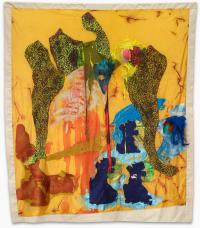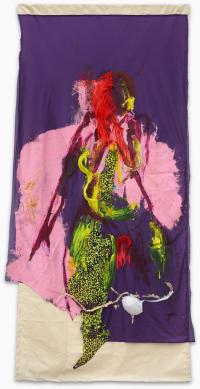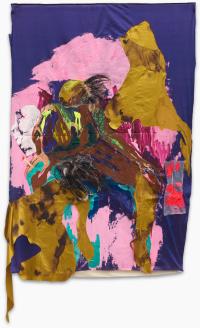Works



Installation Views
Press Release
Jan Kaps is thrilled to present the second solo exhibition by Kresiah Mukwazhi at the gallery, entitled Ndakamira pamukaha (Standing my ground till it cracks).
Kresiah Mukwazhi’s practice has been characterized by her advocacy for visibility and the rights of women who face discrimination in patriarchal societies. Committed to an approach of visual activism, the artist explores the female body as a site of power relations in performances, video works, and textile collages.
In her new series of nine textile works, partly wall-mounted and free-floating in space, Mukwazhi turns her attention to the underlying structures of such systemic violence. Referencing a variety of sources, the artist exposes and deconstructs the narratives that present women as the Other in Zimbabwean society.
Although concerned with broader structural questions the artist explores these in specific social environments. The titular work refers to the hierarchies of chiefdom that are typical of rural Africa. In a collage of loosely cut cloth and rawly applied paint Mukwazhi refers to the act of challenging such an imbalance of power by a woman stripping in resistance, something that is believed to cast a bad omen on the agitator. Instead of being sexualized, the female body becomes a site of protest giving the woman an almost otherworldly strength.
Several of the works challenges the relationship between private and public and thus the question of visibility - strongly regulated in Zimbabwean society - is reversed. Using a tactile language of lustrous fabrics that are coded as feminine and intimate, private situations may be associated that aren’t supposed to be seen by the public eye. By selecting such fabrics Mukwazhi turns a social rule of conduct upside down, at once reclaiming the autonomous female body. Consequently there is an act of care implied in these works, represented by the hands of women teaching Chinamwali, sex education that hails from Malawian culture, believed to empower women as it helps them understand their bodies and enjoy sex.
By questioning certain standards of behavior the artist also challenges cultural taboos, a concept that still plays an important role in African societies, far more than in those of the western hemisphere, which are more structured by the concept of normalizing behavior.
In the two works, Mukadzi, muka uti dzi! (Woman, thou art loosed!) I and II, the artist refers to such a transgression, the act of slaughtering a beast as an act traditionally reserved for men here being performed by a woman. Depicted in layers of loosely sewn fabrics, combined with an expressive brushstroke, the scene is portrayed as so unlikely that people are looking up to this very act. However, using her characteristic animal prints on iridescent dyed fabrics for both perpetrator and victim, both are reflected as part of the very same system of socio-political structures.
Yet there is still another layer in these semi-abstract scenes. The woman slaughtering a beast is mounted on a disembodied leg, spread in a supposedly offensive manner with its counterpart. At the same time this very posture symbolizes taking a firm stand and thus giving the exhibition title a visual anchor. Translated as standing on a ground till it cracks, with this Shona saying the artist not only marks her own relentless stand, but is calling for possibilities of empowerment and care for all those whose precarious conditions she is concerned with.














